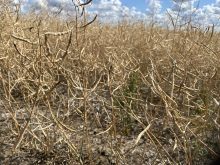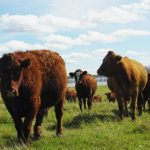Corp. control
The problem with softwood lumber, grain and mad cow (disease, or BSE) is all about corporate control.
When Canada got into the Free Trade Agreement and the North American Free Trade Agreement, they signed over decision making to the corporate elite.
When (Jean) Chrétien ran for prime minister, he promised he would renegotiate the agreements but he promptly forgot.
For some reason our government is hell bent on selling off our corporations, which are now over 50 percent foreign owned. Canadians don’t know how to run them. Which means all decision-making, high-paying CEO jobs and profits are going to wherever the head offices are, and they used our banks to do this.
Read Also

Rural emergency room closures continue to be vexing problem
Staffing issues are at the root of disruptions and closures in hospital emergency departments, both in rural and urban Canadian locations.
All this means is a smaller tax base that the ordinary citizen will have to make up if we want to keep our social programs. Just look at the cutbacks in health care and schooling, which they would like to privatize to save money.
Our corporate controlled think tanks and media constantly harp about high corporate taxes. They think if they repeat it often enough, people will believe them.
However, our country has one of the lowest corporate tax rates anywhere. That is why so many foreigners invest in our country …
– Ron Verkerk,
Chetwynd, B.C.
Touching story
I would like to add my name to the many subscribers who will be congratulating the Western Producer on their 80th year of publication. The front page story about the combining bee was a touching illustration of neighbours and friends helping friends dealing with a frightening situation. God bless them all.
Although we have lived in Ontario most of our lives, I have had an interest in western farming since 1943. When I was training on the RCAF base in central Manitoba, I was lucky to meet a true western girl. In 1943, she joined the WRENS, the female branch of the Royal Canadian Navy, and spent the next two or so years on naval stations in Eastern Canada.
We were married after the war ended in 1945. I thank the laws of chance that put me in training in Manitoba where I met this wonderful girl. I often mentioned to Laura that I wished that my youth had been in central Manitoba because her early life sounded so interesting to me.
However, besides many visits to the Grandview area, we spent our lives in southern Ontario.
Bad luck comes to anyone, and Laura has been affected by Alzheimer’s disease for about the last 12 or so years. …
We had a wonderful full life together for 55 years, and are thankful for those years of life and productivity together.
– J. A. Campbell,
Bloomfield, Ont.
Clock ticking
The clock is ticking loud and rapid for 10,000 cows in central- western British Columbia.
I attended a meeting in Vanderhoof in August in hope that the B.C. Cattlemen’s Association and the governments could find a solution to our looming problem.
The BSE dilemma has left the borders closed to exports into the U.S. for live cattle. We have a hay shortage because of our dry summer and we have a large surplus of cull cows. The reality is that it will cost more to feed these cows through winter than they’re worth.
The B.C. government has done nothing and is hoping the problem solves itself and goes away. The federal government has come up with a farm income stabilization plan, which does nothing for the immediate problems. So we are faced with high-cost feed, shortage of feed and animals worth less every day.
The cattlemen had a plan to destroy and bury the backlog of cull cows before they starve. The government still doesn’t have a plan to deal with these cows. They fear a consumer backlash if these animals are slaughtered.
What if the consumer sees starving and dead animals showing up in rural dumps this winter?
We cannot wait for the border to open, it will not help this crisis we are facing for eliminating the backlog of cull cows. The feedlots are full and the abattoirs are backed up for slaughtering.
So 620,000 cows Canada-wide are waiting for the governments to make a decision and a plan.
While we wait the feds are debating same sex marriages, which seems to be more important than an entire industry collapsing. The clock is ticking and winter’s not far away. The provincial and fed governments must act now or face major losses for many years to come.
– R. Johnson,
Red Rock, B.C.
Canadian first
… I agree totally with letters printed in the Western Producer, July 3, “U.S. suppression,” by Ian Eggen and Aug. 28, “What happened to NAFTA?” by Lee Morrison, W. M. Pender from Fort Macleod, Alta., also on “U.S. suppression,” Colleen Seaman from Eyebrow, Sask., on “Buy Canadian” and Rodney Pearn from Virden, Man., on the “Hurt goes on.”
Now it is time for me to put my own thoughts on paper. They find one cow in Alberta with BSE (bovine spongiform encephalopathy) and it never entered the food chain. The American reaction is to close its border to Canadian beef for who knows how long.
Our beef is safe. All summer Canadian consumers, bless them, have increased their consumption of beef. We have now a surplus of beef with the closed U.S. border.
So why, I ask, are we letting American beef into our country? They tell me we can’t stop it because of the NAFTA. As the above letters suggest, the NAFTA is a farce. The Americans get to make their own rules and the Canadians and Mexicans suffer.
The Americans have done it to us in the B.C. softwood lumber industry, the potato industry in the Maritimes, and now their border is closed to cattle producers and they are increasing the tariff on our wheat.
The Canadian government must play the same game. Apply an export tax to Canadian petroleum and electricity. We could dedicate the tax revenue to direct relief of our punished industries. The largest gas and electricity exporters are the provinces suffering the most from U.S. suppression to us. If our politicians will not go to bat for us, all we as consumers can do is buy Canadian and Canadian only. …
Also it is not fair that farmers pay more education tax than other people do. Farmers, due to BSE and the drought, can no longer afford this heavy education tax. George Bush is looking after his farmers. It is time the Canadian government did the same or else there will be no farmers or small towns left in Canada.
– Myrna Drake,
Elkhorn, Man.
Grade 5 marketing
The Canadian Wheat Board has once again proven it is not only a failure, but an insult to the ability of western farmers to market their own grain.
The crop year of 2002 was a complete disaster, the worst drought in recent memory, as well as a wet harvest that left thousands of acres to be harvested the following spring. The result was commodity prices for all grains skyrocketed. Farmers captured record prices for their peas, lentils, mustard and canaryseed.
What did the wheat board do? They withdrew from the market to keep their milling friends happy and then stood by to watch as the wheat and durum market collapsed.
Farmers in Western Canada should launch a class action lawsuit against the board of directors of the Canadian Wheat Board, as well as the federal treasury, to recover the billions of dollars lost with such a fiasco. Any Grade 5 student could have done a better job of marketing.
The actions of the board of directors of the wheat board parallel that of WorldCom and Enron. The only difference is what they did was legal in Canada.
– Herb Axten,
Minton, Sask.
Farmland tax
As of now there is an election coming up in Saskatchewan. Is there so far a party that mentioned reducing the school tax, which has gone mental?
I’m now paying $1,034.88 on the quarter I have left, which they added $39 this year around, plus I’m paying $575 school tax on my house in town. I am now 82 years old and still paying (money) which I could use on my retirement.
How can we get a handle on these tax rippers? Let’s get on our high horse and write our MLAs.
– Bernard Schreiner,
Naicam, Sask.















